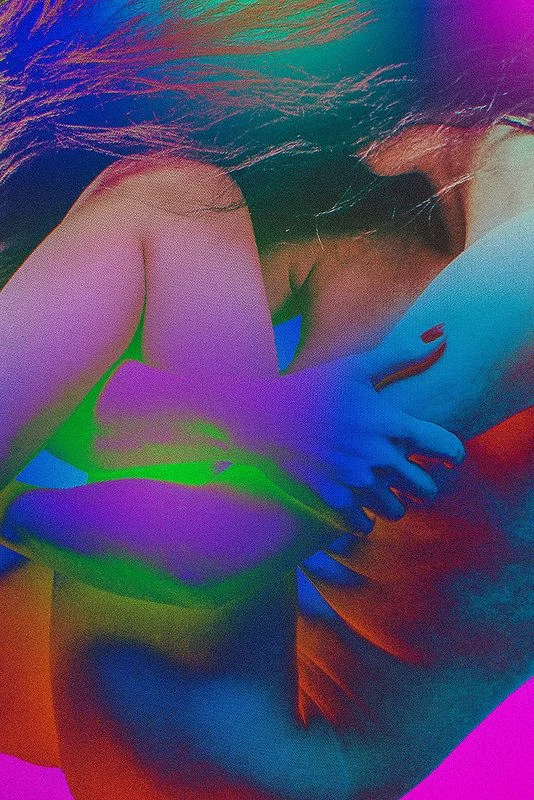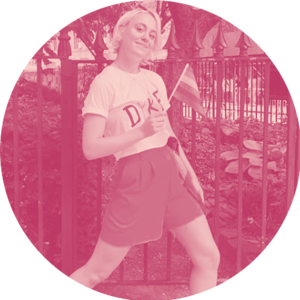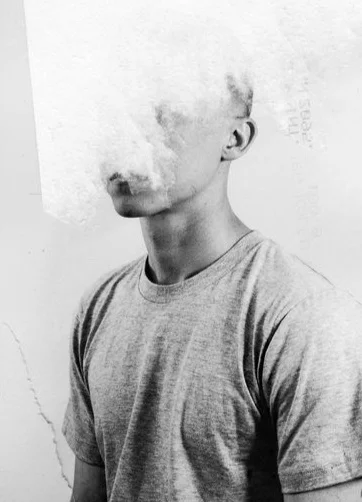A Baby Gay’s Guide to Getting Over Your First Lesbian Crush
My favorite scene to date of The L Word is defining of its twelvth episode of season one, called “Looking Back,” where each woman from the show’s lesbian friendgroup tell the stories of their “firsts.”
To some, this term may not mean much — their first middle school crush, their first boyfriend, even the moment they lost their virginity (a term I hate to use, but is often conflated with the idea of “first time”). But to the queer women on the screen, the saying, or as they call it, their “coming out stories,” meant a lot more. Shane’s was of course centered around her 10-year-old self falling for another girl of the same age, and Dana confessed about her forbidden romance with a tennis camp counselor when she was 16. We hear about Tina’s love-at-first-sight story with Bette, and then Jenny’s most recent heartbreak by her first love Marina, which we as viewers had already witnessed in episodes prior.
But the first “coming out story” we hear, as told by Alice, oddly felt the most satisfying — she went on about having the hots for the new bassist in her college band and soon getting her heart broken by the same girl. Although portrayed quite humorously, this one resonated the most with my 19-year-old self who had never come close to falling in love with another woman. Instead, I had far too many unrequited crushes on girls, queer or not, and at times unsuccessful flings that would feel like a broken heart, even when they only lasted a few weeks. Through the vast range of “coming out stories” told through the episode, this one reminded me that the first few, or first ten, even, crushes one has as a baby lesbian hurt the most.
And more importantly, that you never forget your first crush on a girl if you’re queer.
I don’t mean those trivial crushes you have on your high school classmate where you’re not sure if you like her cool haircut or actually want to kiss her (we’ve all been there). I mean those crushes that made you realize that it’s more than just liking a cute girl’s hair, but that maybe, just maybe, you thinking that girl is cute is actually a sign that you’re gay! Those crushes that make your heart flutter whenever she looks your way, whenever she decides to talk to you (no matter how platonically), whenever she leans in for a (again, platonic) hug.
Because sadly, many of our first lesbian crushes are not requited; they’re rather crushes from afar that never extend past writing a gross amount of journal entries or bad poetry about not only how infatuated we are with said crush, but how she made us realize a lot of things that our 17-year-old brains couldn’t handle. For those whose “first” happened to be a beautiful, reciprocated romance, these words may mean nothing to you, but I’ve heard from most of my queer friends that their firsts were unrequited like mine, or at least nothing as groundbreaking as Tina’s commited romance with Bette — maybe something casual like Alice’s instead.
No matter how casual, though, it doesn’t make them any less impactful.
I put my first lesbian crush on a secret pedestal; knowing she was also queer when I was a senior in high school, first beginning to question my sexuality, made me fall harder than I’d ever fallen before. My crushes before were only sad indie skater boys who were all too pretty (such a closeted lesbian mood), and the feelings that surfaced from them were entirely superficial — I never wanted them to kiss me; I just wanted them to like me back to possibly prove my desired heterosexuality. But with this girl, things were different. I not only wanted to kiss her, but I wanted to do absolutely everything with her (I won’t spare you the details). My heart dropped whenever she texted me, whenever she was in the same room as me, whenever I got to look into her eyes. I told only a single soul about her, aka my best friend — I was terrified of admitting that I liked A GIRL (!!!) to the rest of my friends, as it would affirm my gayness that I wasn’t quite ready to face. Instead, I kept her to myself, similar to how I kept my middle school feelings for girls to myself on Tumblr. I was also a bit delusional — I sometimes imagined a potential future with us because she was also into girls.
My heart was inevitably broken as we moved our separate ways for college, even though nothing ever happened between us. I carried the hope that I would find so many more lesbians and queer women at school, but the old feelings at times lingered whenever I saw her post on social media. After a few more crushes and several check marks off my “first time” list, my romantic fantasies about her quickly became formative high school memories that only held bits of nostalgia. Looking back, I can only laugh at how infatuated I was — if I were to meet her today, I would probably not think twice about pursuing anything more than platonic. My type has dramatically shifted, and I also feel more confident in my sexual and romantic pursuits (at least I like to think so). I’m now far more surrounded by other queer women that I don’t have to catch feelings for the one sapphic girl at my school; I have options!
But, being in a conservative high school where I thought I was the only one attracted to other girls forced me to possibly confuse validation with romantic feelings. I would at times talk to my other peers at school, pre-coming out, and ask them, “Isn’t everyone just a little gay?”, thinking my feelings were universal and not a sign of me actually being gay. So discovering that another girl, who I also happened to be attracted to, was also into girls blew my mind. I can’t deny the sexual attraction; I had never even thought about having sex with another woman until my crush developed with her. She exposed me to feelings of lust and love that I had never known before. But neither were reciprocated, not even close — yet, I was somewhat okay with that. I held her on this secret pedestal not just because I (thought I) was in love with her, but because she showed me a beautiful world of queerness without her even realizing it.
And to the baby gays: I got over her. Pretty easily, actually.
In the moment, those first time butterflies feel like the world; they validate your once-isolated feelings about not only thinking girls are hot, but that maybe you’d even want to date them — a very scary thought to have at any age. They turn your daydreams into a possible reality, even when nothing ever comes of it. For lesbians, they make those previous crushes on boys feel like grade school stories; for bisexual and queer girls who are into other genders, they validate the fact that it’s not “just a phase.” They allow us to acknowledge that we do have sexual desires, that we’re even capable of having a relationship with another woman. They validate us in ways we never imagined before they came into our lives, making it seemingly impossible to ever fall for another girl, especially when we don’t think we’ll find any other queer girls (if your first lesbian crush was straight, this may not apply). This is what makes it so hard to move on, especially in our baby gay days when a single rejection or finding out your crush is taken feels like the end of the world.
But looking back, almost four years later, I can confirm that moving on is possible, and you will meet more queer women to lust over, to have extremely unsuccessful flings with, to have relationships with, to even fall in love with. You may always view your first as defining, as even the most important crush of your life. Which is understandable! There are ways to hold your first lesbian crush as important but not the center of your universe, although not everyone’s trajectory may look the same.
Because you won’t only feel pain from your first crush; your heart will break from your second, and your third. My first “breakup,” if I can even call it that, with a woman I didn’t even like that much hurt a lot, even if for only a few days. Once I finally had the courage to ask out girls myself, getting rejected the first few times made me feel like I was never going to find love. The ending of my first relationship with a woman I actually did like a lot shattered my heart into a thousand pieces. But then things started to get easier — my next breakups felt a little less depressing, I stopped taking rejections close to heart, and I always looked back to those dark times as holes I’ve been able to dig myself out of. I’m grateful to have sad gay music to soothe my heartbreak (King Princess’s new album is my current go-to) and queer friends to vent to and remind me that there’s so much more to my gay life than a girl who once destroyed my heart.
It’s so unbearable to move on from your first, or your second, or your third, because every lesbian relationship you’ll have feels far more meaningful than those of our straight counterparts. The exaggerated heartbreak they felt in high school is equivalent, if not less, than the feelings we feel as baby queers far later in life when a girl we like likes us back, when we fall in love, when they abruptly fall out of love. I once told an old flame how the romantic connections and relationships I have as a lesbian feel so much more meaningful, therefore harder to let go, simply because finding these connections in the first place is already so difficult. Every spark, every mutual attraction, every successful date feels like the world due to the years you’ve been denied these feelings. So of course your first will feel like the world, and of course letting her go will feel like the end of the world.
To the baby gays: you will have so many more wonderful and equally terrible gay experiences that will guide you in learning about your own queerness, in loving other queers, and in understanding how to get over women (which feels almost impossible, considering I view all women to be literal angels). You’ll get rejected, you’ll have to be the one to do the rejecting, you won’t fall for another woman who fell for you until the minute she decides it isn’t worth it. You’ll have mutual crushes that develop into flings into relationships into first loves, both that could be entirely successful or a huge mistake. You’ll go on ten miserable dates per every successful one, and only a small percentage of those successful dates will turn into something more. You’ll have incredible sex and terrible sex and just okay sex, all leading you to make more sense of what you like sexually. You may fall in love, you may fall out of love even more. Each heartbreak will start to feel less catastrophic, simply because things will get easier with the gay experiences we all deserve (yes, even the negative ones).
So, your first, other than being the one to pave the way for the rest of your queer love journey, is just a speck in the universe who will mean a miniscule percentage of what she used to mean only years after your coming out story. Think of moving on from them as a way for you to continue your queer trajectory and have those formative experiences that, at the end of the day, will teach you far more than an unrequited crush.
About the Author
Natalie Geisel (she/her) is a senior at The George Washington University studying women’s, gender, and sexuality studies with minors in English and communication. Her love of writing sprouted from starting her fashion blog in high school, and her current written work focuses on topics of LGBTQ+ content, culture, and identity. Launching and managing Camp Thirlby was out of interest in intersecting gender and sexuality into the world of youth and wellness, hoping to add marginalized voices, like her own queer one, to an underrepresented community. When she’s not writing, she spends her spare time at dance rehearsal, attending local indie shows in the DC area, or finding the best cafes that serve oat milk. She’s passionate about inclusive sex education and sustainable fashion and thinks everyone should be, too. You can view all of her written work on her website.



